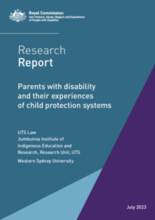Executive Summary:
This research sought to improve understanding of the experiences of parents with disability of Australian child protection systems, paying particular attention to the experiences of First Nations and culturally and linguistically diverse parents with disability. It addressed the following questions:
- What are the experiences of parents with disability across the spectrum of engagement with child protection systems from initial reports of child protection concerns to out-of-home care (‘OOHC’) and restoration or permanent removal?
- How do child protection systems meet or breach parents with disability’s rights, including their rights to be supported?
- What reforms are necessary to reduce the risk of parents with disability and their families coming into contact with child protection systems and, when in contact, prevent escalation of the severity of interventions?
- What are some examples of promising practices that work to improve outcomes for parents with disability and their families?
The project has three components:
- an extensive critical review of published English-language research;
- a primarily paper-based review of Australian policy and practice, and
- qualitative fieldwork with parents, advocates, caseworkers, service providers, Children’s Court clinicians and lawyers in NSW and Victoria.
All data was evaluated with respect to internationally recognised human rights principles – in particular, those rights articulated in United Nations Convention on the Rights of People with Disabilities (‘CRPD’)’, International Covenant on Civil and Political Rights (‘ICCPR’), Convention on the Rights of the Child (‘CRC’) and the Declaration on the Rights of Indigenous Peoples (‘UNDRIP’).1 The scope of the fieldwork was limited by the short timeframe and limited project budget, precluding fieldwork across all jurisdictions. Consistent with the critical human rights and intersectional standpoint of the project and informed by gaps in the research identified in the literature review, the fieldwork focussed on investigating and elevating the voices of parents with disability, advocates who work with them and service providers who are engaged in supporting them. While this research makes a contribution to addressing this gap, further research is necessary. This includes particular foci on First Nations and culturally and linguistically diverse parents with disability and parents with disability’s experiences across all Australian states and territories, and spanning the continuum of child protection involvement.

